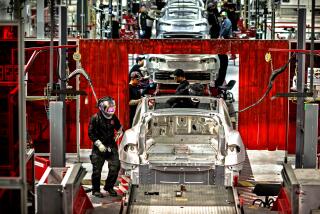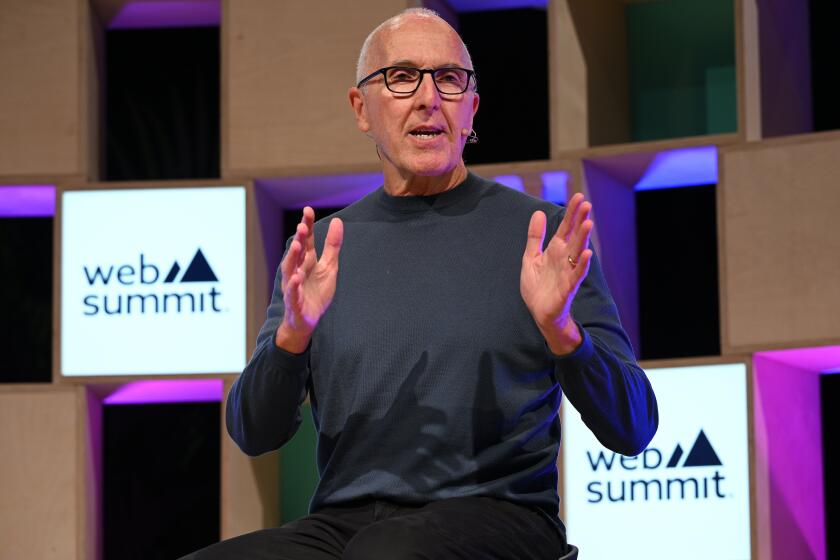The Suit
It’s not that Team Disney wins all its games. Sometimes its march to multiple championships is interrupted--Euro Disney’s cost overruns and profit shortfalls when it was launched, the historico-environmental outcry that prevented another theme park, Disney’s America, from moving off the drawing boards and into the countryside near Washington, D.C. It’s not that occasionally one of its stars--bumptious Jeffrey Katzenberg, self-mythologizing Michael Ovitz--fails to perform in a manner that pleases head coach Michael Eisner.
It’s that by now these blunders and bobbles have no real consequences; they are merely annoyances, temporary, quickly transcended affronts to Eisner’s highly developed sense of corporate propriety. For his team is, in reality, many teams playing on every field known to modern, amusement-addled man (and, of course, woman and child). If one of them happens to falter, there are sure to be others rolling irresistibly toward that 20% annual growth rate that is everyone at Disney’s goal and goad. In a company where synergy is a fetish, it’s this synergy at the bottom line that really counts and must at all costs be protected.
That doubtless explains why so much of Eisner’s autobiography, “Work in Progress,” particularly its final two-thirds, which are devoted to his 14-year reign as chairman and chief executive of the Walt Disney Co., is such bland reading. In that period, he transformed the company from a stodgy little operation living cautiously on its founder’s good name and comfortable legacy, grossing a modest $1.65 billion annually, into the world’s second-largest media empire, taking in $22 billion a year. Eisner would have us believe that this turnaround--surely one of the most dramatic in the history of modern American enterprise--was undramatically accomplished by a hard-working, self-sacrificing band of brothers collegially debating strategies and tactics, then, once a course was decided, pursuing it with mutually supportive good cheer.
In this spirit, Eisner devotes pages upon pages to the guys in suits--not too many gals rise to the top of this hierarchy--who made it all happen. No tantrums, no sulks, no irredeemable failures are recorded. Each “cast member” (corpspeak for employee) is briskly, kindly characterized. All their contributions to the endless analytical and planning discussions by which this company eases itself forward are carefully praised, even when their ideas are rejected. Especially treasured by Chairman Michael are those who uncomplainingly set aside personal preferences and ambitions to embrace difficult new assignments that might advance the common good. As a tool for maintaining corporate morale, this recital may have its uses, but it is a curious thing to see a man literally giving up so much of his “life” to his associates. And as a literary device, it has a distinct tendency to numb.
So does his treatment of that dwindling number of events and people that elude Disney’s control. Eisner, it seems, has never encountered a setback or mishap in which he fails to detect an opportunity. Even when he confronts organized and vocal opposition by outside forces, he regards their ignorance as vincible. Surely, he thinks, Disney needs only explain itself--its high educational motives, its pure morality, its compulsive tidiness and, ahem, its ability to create new jobs with its new ventures--to vanquish the doubters. If, after all that, his opponents remain obdurate, he blames himself and the company for failure to properly communicate its values. In other words, it is easier for him to look for a flaw that can be fixed within the organization than it is for him to admit that some human natures may contain an anti-Disney gene, incurably cantankerous and perverse, that resists the cute, the cuddly and the clean and requires an element of anarchy, a touch of the transgressive, to make life interesting and popular art worthwhile--even for children. Perhaps one should say especially for children.
Of course, asking for such an admission from someone like Eisner is to ask the impossible. Men do not arrive at positions like his by way of extensive philosophical musing. They get there by hard, blinkered work, by practical problem-solving, by institutional loyalty and, as he repeatedly says, by learning to put their mistakes behind them and moving relentlessly forward. This being so, it follows logically that the best parts of “Work in Progress” are its early passages in which a young, engagingly self-deprecating Eisner discovers these truths and finds within himself the talent and the will to embrace them.
It’s easy to imagine that bright, energetic young man succeeding at something. It is much harder--therefore perhaps more of a tribute to him--to imagine his becoming the rescuer of Walt Disney’s beleaguered empire, much less turning himself eventually into a kind of Super Walt, extending “the brand” into realms--Broadway and broadcasting, video cassettes and the Internet--the Founding Father never envisioned. Superficially, their backgrounds could not be more dissimilar. Disney’s was small-town, WASP, poor and ill-educated; Eisner’s was urban, Jewish, well-to-do and culturally advantaged. Where the young Walt’s task was to invent his way toward stability and gentility, young Michael’s was to imagine his way out of it.
A summer camp that stressed wilderness adventure (where he learned the value of team work); a small free-spirited liberal arts college in Ohio (as opposed to Princeton, from which his father graduated); a passion for the theater (which led to an expatriate spell in Paris, where he tried playwriting)--all helped open him up and confirm the educative value of the risk-taking impulse. In his eagerness to succeed on all fronts, he sometimes cuts an agreeably risible figure. Trying to impress the woman he would marry with his macho credentials by taking her on a camping trip, he finds that she deals with a marauding bear more bravely than he does. Going for a job interview at ABC, he mistakes an abrupt underling (who turned out, fortuitously, to be Barry Diller) for the higher-up (Leonard Goldenson) he was supposed to see. He worries that his suits don’t hang quite right and that all his hair days are bad ones, but as he rises, first at the television network, then at Paramount Pictures, the qualities Eisner shared with the younger Walt Disney become more and more apparent to the reader: energy, of course, and an unpretentious way of presenting himself; a sense that, as Eisner puts it, you can’t fall off the floor, which frees you to take risks with untried or lagging enterprises; and perhaps most important, a powerful narrative instinct, an ability to recognize the kind of stories lots of people would like to hear and to structure them into forms that compel attention.
The climax of this relatively unguarded story comes when the keys to the Magic Kingdom are dangled before him and Frank Wells, who would become his partner in its redemption. They were not everyone’s choice, and Eisner tells the story of how they won their jobs in suspenseful detail, without disguising his passion for the post, the vertiginous ups and downs of the quest. I have no doubt he can still summon such emotions. You can see them sometimes in large matters--in the heartfelt way he mourned for Wells when he died shockingly in a helicopter accident--and in small--Disney’s chief executive scaling a fence in the dark of night to see how a competing theme park, down the road from Florida’s Disney World, is coming along.
Still, on the evidence of this book, we must conclude that Eisner has come to share one more trait with Walt Disney, perhaps with everyone who devotes himself fully to growing that most complex of organisms--the modern consumer-oriented corporation. That is the belief, so often a byproduct of large success, that the company’s good is unquestionably, inextricably intertwined with the larger social good. In his funny, almost thoughtless anti-Disney screed, “Team Rodent,” recently published in the Library of Contemporary Thought series, Carl Hiaasen manages to make this inarguable point about the company: “Square in the middle is where it wants us all to be, dependable consumers with predictable attitudes. The message, never stated but avuncularly implied, is that America’s values ought to reflect those of the Walt Disney Co., not the other way around.”
In different times and situations, both Disney and Eisner ground the attractively rough edges off their personalities and their operations to make this join more seamlessly. But Eisner’s vast company--unlike Walt’s--stands now on the brink of global dominion over the way children see and imagine the world. No parent can resist Disney’s ubiquity or its cheery reliability as a baby-sitter with a million entertaining stories to tell. No competitor can resist it either, for to contend successfully with Disney you must embrace its values. And, frankly, no critic can precisely pinpoint what harm this power may do. All one can say is that it is instinctively discomfiting to see corporate committees doing their own kind of grinding, attacking the sharp edges of myth, folklore and individual genius (see Disney’s travesty of Victor Hugo’s “The Hunchback of Notre Dame”) and in the process over-polishing them until they are reduced to glittering inconsequentiality. At which point, of course, they can be massively, irresistibly marketed to an impressionable audience--one that can’t tell the difference between the authentic and the ersatz--who, given the seductive power of Disney’s imagery, the overwhelming power of its salesmanship and the tender age at which both are exerted on children, may forever prefer the Disney version not just of cultural classics, but of life itself.
Just as one would like to see Eisner abandon his statesmanlike posture now and then and vent his exasperations with his colleagues and enemies--only Katzenberg catches heat from him, and that’s because he was to Eisner a dark double, the man who still dared speak of matters that had become unspeakable to his boss--one wishes Eisner had shown some awareness that the Walt Disney Co. is not just occasionally, locally controversial, that there is a larger moral-aesthetic dimension to its works that requires complex consideration--and justifications that go beyond comfortable references to the vast popular acceptance of its ventures, the always upwardly mobile lines on its sales charts.






